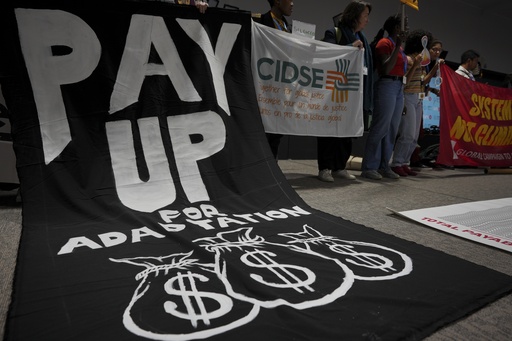BAKU, Azerbaijan – This year, extreme temperatures devastated the pineapples on Esther Penunia’s small plot of land in the Philippines. While the impact was disappointing rather than disastrous for her, as she does not rely on the farm for her livelihood, she fears for the many small-scale farmers in her region who do depend on crops like rice, coconuts, and vegetables that are increasingly jeopardized by climate change.
Penunia expresses hopes that at this year’s United Nations climate summit, funds will be allocated towards supporting agriculture and the family farmers who constitute a vital source of food for millions globally. “If you don’t assist small farmers, where will your food come from?” she questions, serving as the secretary general of the Asian Farmers Association. “Who will cultivate your crops, fish the seas, harvest the honey, or plant your vegetables?”
Numerous nations, particularly those in the Global South, require financial resources to aid in recovery efforts following typhoons that devastate farmland. They also need support for drought protection and to adapt to climbing temperatures through improved seeds, fertilizers, and water systems. However, there is a significant discrepancy between the estimated $1 trillion in climate financing required by poorer nations and the contributions that wealthier countries are willing to make, as highlighted by experts from the World Resources Institute.
Regardless of the agreements reached, it is clear that funds must be utilized judiciously. There is ongoing debate regarding the distribution of financial resources towards agricultural support versus those aimed at fossil fuel emissions reduction.
According to a report from the Climate Policy Initiative, less than 1% of climate finance is directed towards smallholder farmers, even though food systems represent about one-third of global greenhouse gas emissions associated with climate change.
As temperatures rise, the challenge for farmers to adapt becomes increasingly daunting. Ismahane Elouafi, the executive managing director of CGIAR, a global agricultural research initiative, stressed at a COP29 panel that it is essential to invest in agriculture, given its significant role in the climate crisis. “How could we expect to resolve this issue without investing in a sector that contributes to a third of the problem?” she stated.
Praveena Sridhar, the chief science and technical officer of Save Soil, proposed a more straightforward argument for funding agricultural adaptations to climate change. She noted that, while discussions regarding fossil fuel reductions are complex, supporting proven agricultural solutions should be a more manageable endeavor. “We have not entirely pieced together the puzzle. So why not focus on the solutions we already know work?” she said.
However, some experts express concerns that focusing on agricultural funding could detract from the urgent need to address fossil fuel dependency. Zeke Hausfather, a research scientist with Berkeley Earth, acknowledged the potential for land management practices to lower carbon dioxide emissions but indicated that the maximum possible reduction would only be around one billion tons annually—a drop in the bucket compared to the 40 billion tons emitted each year globally. He also cautioned that carbon sequestered through improved farming practices isn’t guaranteed to remain stored long-term.
Despite these challenges, various countries, corporations, and private investors have begun to channel significant investments into agricultural technologies. A notable commitment of $9 billion was made at COP28 for a collaborative initiative between the U.S. and the U.A.E. aimed at advancing agricultural innovations to fight climate change.
With the potential shift in U.S. climate policies under a new administration, Secretary of Agriculture Tom Vilsack expressed optimism that the momentum behind climate-related agricultural projects would continue through efforts at local and state levels, even in the face of potential federal reversals. “We have three levels of government in the U.S., and I believe there will be a lot of activity in cities and states that will support these initiatives,” Vilsack remarked.
For advocates like Penunia, the absence of farmers’ voices from discussions at the previous U.N. climate talks was disheartening. “We hope to be genuinely heard,” she affirmed.
